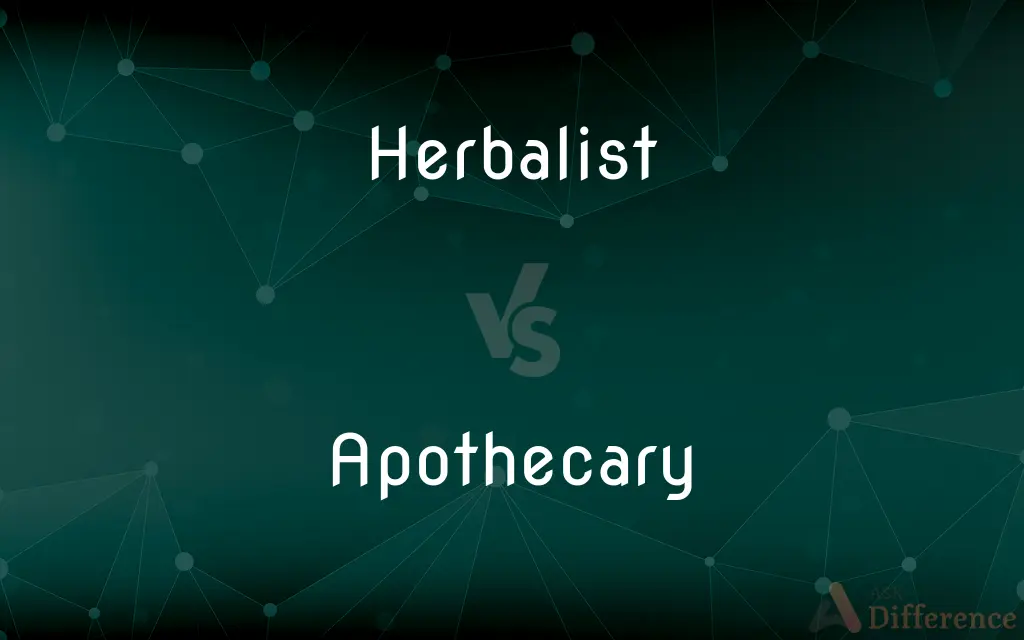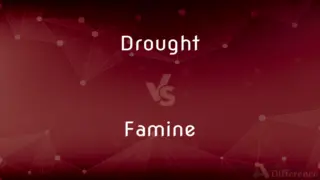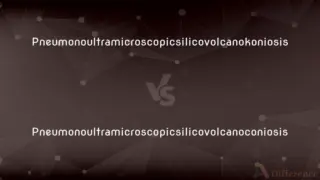Herbalist vs. Apothecary — What's the Difference?
By Fiza Rafique & Urooj Arif — Updated on April 3, 2024
Herbalists specialize in using plants for medicinal purposes, while apothecaries historically prepared and sold drugs and medicines.

Difference Between Herbalist and Apothecary
Table of Contents
ADVERTISEMENT
Key Differences
An herbalist is a practitioner who focuses on the study and use of medicinal plants to prevent and treat illnesses or to promote health and well-being. Apothecaries, on the other hand, were historical figures similar to today's pharmacists.
The work of an herbalist is rooted in a holistic approach to health, emphasizing the use of natural, plant-based remedies. They often engage in consultations with individuals, providing personalized herbal treatments that cater to specific health needs and conditions. This practice is based on traditional knowledge, sometimes passed down through generations, and is increasingly supported by modern scientific research.
Apothecaries were more diverse in their practices, combining the roles of chemist, pharmacist, and general practitioner. They were skilled in the art of compounding medicines and were knowledgeable about a wide range of ingredients beyond just plants. With the evolution of the pharmaceutical industry, the traditional role of the apothecary has largely been absorbed by the profession of pharmacy, focusing on the dispensation of manufactured drugs.
Despite their differences, both herbalists and apothecaries share a common goal of healing through the use of substances derived from the natural world. The rise of interest in alternative and complementary medicine has led to a resurgence in the popularity of herbal remedies, highlighting the enduring relevance of traditional practices in contemporary healthcare.
Comparison Chart
Focus
Medicinal plants
Medicinal concoctions including herbs, minerals, and animal parts
ADVERTISEMENT
Historical Role
Traditional use of plants for healing
Compounded and sold medicines, diagnosed and treated patients
Modern Equivalent
Practitioners in alternative and complementary medicine
Pharmacists
Practices
Growing, harvesting, and preparing herbal remedies
Compounding medicines; historically, diagnosing and treating patients
Basis
Holistic, often traditional knowledge
Broader range of medicinal knowledge, including chemistry
Compare with Definitions
Herbalist
Specializes in medicinal plants.
The herbalist recommended echinacea to boost immunity.
Apothecary
Often diagnosed and treated patients.
In the absence of doctors, apothecaries provided medical care.
Herbalist
Practices may include wildcrafting.
She learned wildcrafting techniques to sustainably gather herbs.
Apothecary
Utilized a broad range of ingredients.
Apothecaries used not only plants but also minerals in their remedies.
Herbalist
Engages in education and consultation.
An herbalist might offer workshops on herbal remedies.
Apothecary
Acted as early pharmacists.
Apothecaries were the go-to for medicinal advice in their communities.
Herbalist
Uses herbs for holistic healing.
Herbalists often create personalized tea blends for their clients.
Apothecary
Skills evolved into modern pharmacy.
The profession of pharmacy traces its roots back to apothecaries.
Herbalist
Focuses on traditional knowledge.
Herbalists preserve ancient healing traditions through their work.
Apothecary
Apothecary () is one term for a medical professional who formulates and dispenses materia medica (medicine) to physicians, surgeons, and patients. The modern chemist (also known as a pharmacist in American English) has taken over this role.
Herbalist
A practitioner of herbalism.
Apothecary
A person who prepared and sold medicines and drugs.
Herbalist
One who grows, collects, or specializes in the use of herbs, especially medicinal herbs.
Apothecary
One that prepares and sells drugs and other medicines; a pharmacist.
Herbalist
See herb doctor.
Apothecary
See pharmacy.
Herbalist
A person who treats diseases by means of medicinal herbs.
Apothecary
Synonym of pharmacist: a person who sells medicine, especially (historical) one who made and sold their own medicines in the medieval or early modern eras.
Herbalist
One skilled in the knowledge of plants; a collector of, or dealer in, herbs, especially medicinal herbs.
Apothecary
Synonym of pharmacy: an apothecary's shop, a drugstore.
Herbalist
A therapist who heals by the use of herbs
Apothecary
(uncommon) A glass jar of the sort once used for storing medicine.
Apothecary
One who prepares and sells drugs or compounds for medicinal purposes.
Apothecary
A health professional trained in the art of preparing and dispensing drugs
Apothecary
Historically prepared and sold medicines.
The apothecary mixed herbal concoctions for various ailments.
Common Curiosities
What is an herbalist?
An herbalist is a practitioner who uses plants and herbal remedies for healing and wellness.
How did apothecaries contribute to modern medicine?
Apothecaries laid the groundwork for the pharmaceutical field, blending science and traditional medicine practices.
Can herbalists prescribe medicine?
Herbalists do not prescribe medicine in the way doctors do, but they may recommend herbal remedies.
Do herbalists need certification?
Requirements vary by region, but many herbalists pursue formal education and certification to enhance their practice.
Who were apothecaries?
Apothecaries were professionals who prepared, compounded, and sold medicinal products, a precursor to modern pharmacists.
How do herbalists learn their trade?
Herbalists often learn through formal education, apprenticeships, and self-study, sometimes drawing on traditional knowledge.
How are herbalists viewed in modern medicine?
Views vary, but many in the medical community recognize the value of herbal medicine as a complement to conventional treatments.
What is the difference between an apothecary and a pharmacist?
While apothecaries served as early pharmacists, today's pharmacists focus more on dispensing manufactured drugs rather than compounding them.
Are herbal remedies safe?
While many are safe, it's important to consult with a healthcare professional, as some herbs can interact with medications or conditions.
Can anyone become an herbalist?
Yes, with the proper education and dedication to learning about medicinal plants and their uses.
What's the significance of the apothecary in history?
Apothecaries were crucial in the development of medicine, serving as the bridge between ancient herbal traditions and modern pharmacology.
Were apothecaries doctors?
Apothecaries were not doctors by today's standards, but they did diagnose and treat patients using their knowledge of medicines.
How do herbalists and apothecaries impact contemporary healthcare?
Herbalists contribute to the growing field of alternative medicine, while the legacy of apothecaries lives on in the practice of pharmacy.
What kind of products might an apothecary have sold?
Apothecaries sold a variety of products, from herbal remedies to chemical compounds and even surgical tools.
Did apothecaries grow their own ingredients?
Some apothecaries grew medicinal plants, but they also sourced ingredients from traders and explorers.
Share Your Discovery

Next Comparison
Drought vs. FamineAuthor Spotlight
Written by
Fiza RafiqueFiza Rafique is a skilled content writer at AskDifference.com, where she meticulously refines and enhances written pieces. Drawing from her vast editorial expertise, Fiza ensures clarity, accuracy, and precision in every article. Passionate about language, she continually seeks to elevate the quality of content for readers worldwide.
Co-written by
Urooj ArifUrooj is a skilled content writer at Ask Difference, known for her exceptional ability to simplify complex topics into engaging and informative content. With a passion for research and a flair for clear, concise writing, she consistently delivers articles that resonate with our diverse audience.
















































